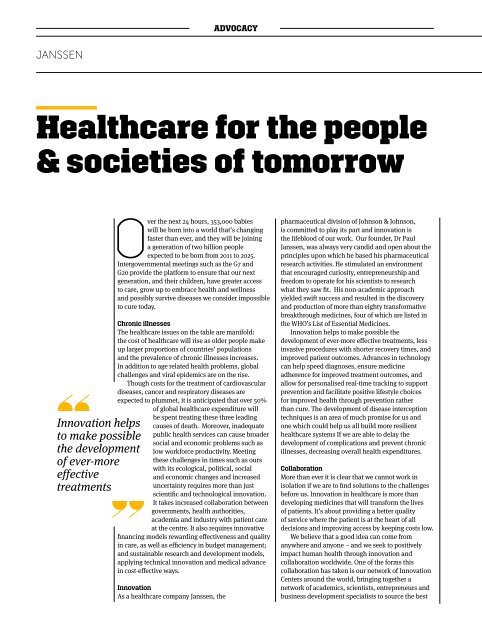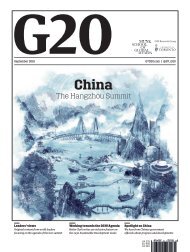G7 Italy-digi
G7 Taormina The 43rd annual Group of Seven (G7) summit, taking place in Taormina in Sicily, Italy, on May 26-27, 2017, will be an unusually important event. Its central participants, time, place, purpose and priorities will inspire it to act on the key issues that cannot be left alone for others later on.
G7 Taormina
The 43rd annual Group of Seven (G7) summit, taking place in Taormina in Sicily, Italy, on May 26-27, 2017, will be an unusually important event. Its central participants, time, place, purpose and priorities will inspire it to act on the key issues that cannot be left alone for others later on.
Create successful ePaper yourself
Turn your PDF publications into a flip-book with our unique Google optimized e-Paper software.
ADVOCACY<br />
JANSSEN<br />
Healthcare for the people<br />
& societies of tomorrow<br />
Innovation helps<br />
to make possible<br />
the development<br />
of ever-more<br />
effective<br />
treatments<br />
Over the next 24 hours, 353,000 babies<br />
will be born into a world that’s changing<br />
faster than ever, and they will be joining<br />
a generation of two billion people<br />
expected to be born from 2011 to 2025.<br />
Intergovernmental meetings such as the <strong>G7</strong> and<br />
G20 provide the platform to ensure that our next<br />
generation, and their children, have greater access<br />
to care, grow up to embrace health and wellness<br />
and possibly survive diseases we consider impossible<br />
to cure today.<br />
Chronic illnesses<br />
The healthcare issues on the table are manifold:<br />
the cost of healthcare will rise as older people make<br />
up larger proportions of countries’ populations<br />
and the prevalence of chronic illnesses increases.<br />
In addition to age related health problems, global<br />
challenges and viral epidemics are on the rise.<br />
Though costs for the treatment of cardiovascular<br />
diseases, cancer and respiratory diseases are<br />
expected to plummet, it is anticipated that over 50%<br />
of global healthcare expenditure will<br />
be spent treating these three leading<br />
causes of death. Moreover, inadequate<br />
public health services can cause broader<br />
social and economic problems such as<br />
low workforce productivity. Meeting<br />
these challenges in times such as ours<br />
with its ecological, political, social<br />
and economic changes and increased<br />
uncertainty requires more than just<br />
scientific and technological innovation.<br />
It takes increased collaboration between<br />
governments, health authorities,<br />
academia and industry with patient care<br />
at the centre. It also requires innovative<br />
financing models rewarding effectiveness and quality<br />
in care, as well as efficiency in budget management;<br />
and sustainable research and development models,<br />
applying technical innovation and medical advance<br />
in cost-effective ways.<br />
Innovation<br />
As a healthcare company Janssen, the<br />
pharmaceutical division of Johnson & Johnson,<br />
is committed to play its part and innovation is<br />
the lifeblood of our work. Our founder, Dr Paul<br />
Janssen, was always very candid and open about the<br />
principles upon which he based his pharmaceutical<br />
research activities. He stimulated an environment<br />
that encouraged curiosity, entrepreneurship and<br />
freedom to operate for his scientists to research<br />
what they saw fit. His non-academic approach<br />
yielded swift success and resulted in the discovery<br />
and production of more than eighty transformative<br />
breakthrough medicines, four of which are listed in<br />
the WHO’s List of Essential Medicines.<br />
Innovation helps to make possible the<br />
development of ever-more effective treatments, less<br />
invasive procedures with shorter recovery times, and<br />
improved patient outcomes. Advances in technology<br />
can help speed diagnoses, ensure medicine<br />
adherence for improved treatment outcomes, and<br />
allow for personalised real-time tracking to support<br />
prevention and facilitate positive lifestyle choices<br />
for improved health through prevention rather<br />
than cure. The development of disease interception<br />
techniques is an area of much promise for us and<br />
one which could help us all build more resilient<br />
healthcare systems If we are able to delay the<br />
development of complications and prevent chronic<br />
illnesses, decreasing overall health expenditures.<br />
Collaboration<br />
More than ever it is clear that we cannot work in<br />
isolation if we are to find solutions to the challenges<br />
before us. Innovation in healthcare is more than<br />
developing medicines that will transform the lives<br />
of patients. It’s about providing a better quality<br />
of service where the patient is at the heart of all<br />
decisions and improving access by keeping costs low.<br />
We believe that a good idea can come from<br />
anywhere and anyone – and we seek to positively<br />
impact human health through innovation and<br />
collaboration worldwide. One of the forms this<br />
collaboration has taken is our network of Innovation<br />
Centers around the world, bringing together a<br />
network of academics, scientists, entrepreneurs and<br />
business development specialists to source the best
















